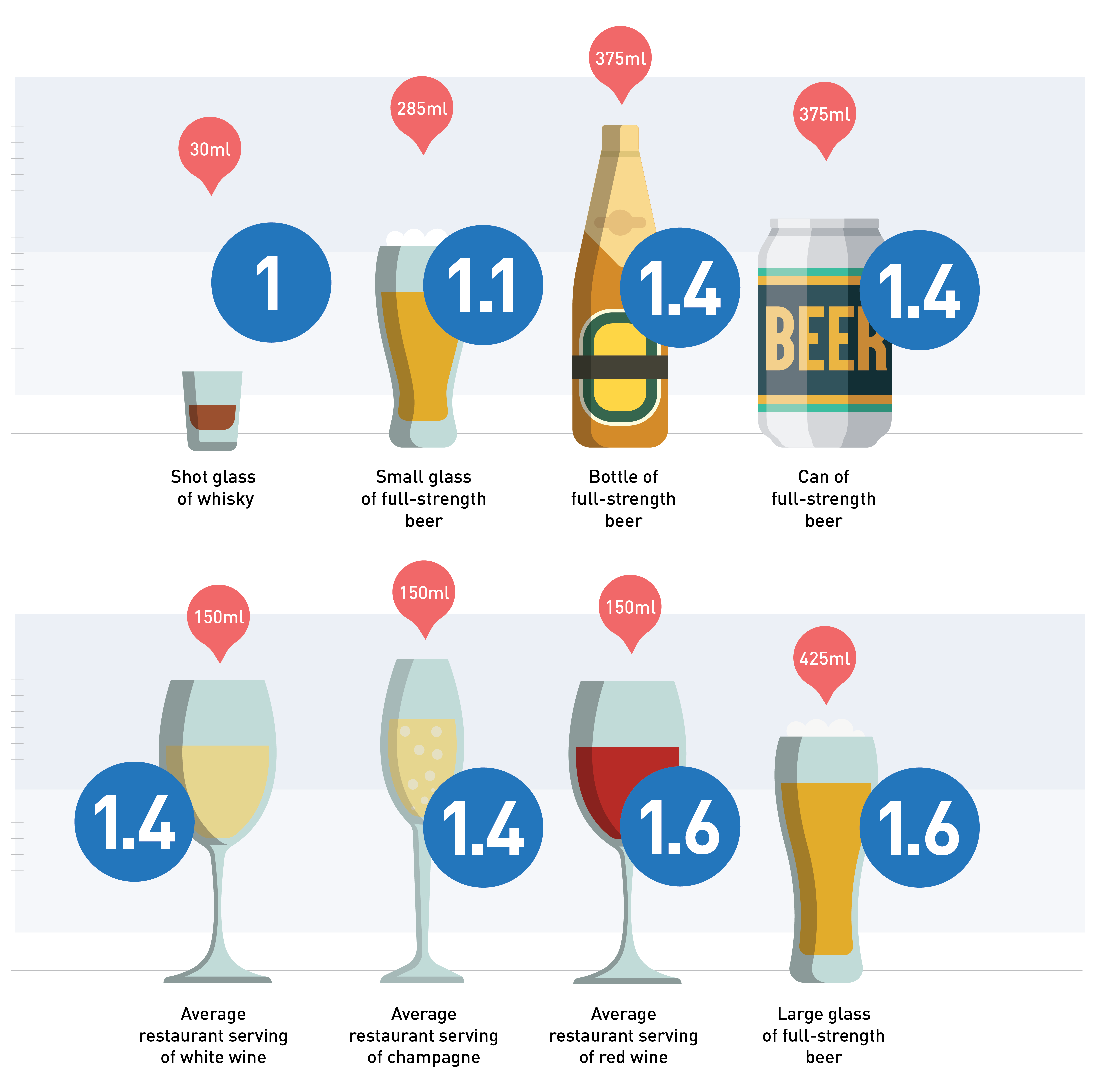-
There’s a lot of talk out there about alcohol and what it does to people’s health. Many Australians are confused about the harms associated with drinking and are unaware that the amount we drink can contribute to health problems, including cancer. In fact, alcohol is considered a grade one carcinogen – that’s the official term for any substance that promotes the formation of cancer cells. This puts it in the same category as the chemicals found in asbestos and tobacco smoke. Gulp. Now, we’re not trying to put a downer on happy hour, but we thought we’d separate the facts from the wishful thinking.
What is a standard drink?
Before we start, it’s important to understand how many standard drinks are in a typical serve of alcohol that you’d find at a restaurant or pub.
Rethink the drink: separating alcohol facts from fiction


-
New Australian Guidelines recommend consuming only 4 standard drinks per day, with a maximum of 10 standard drinks per week, to reduce your risk of harms, such as cancer.
The myths vs the facts
Myth: Alcohol is only bad for people who get drunk.
Fact: It’s not just heavy drinking that increases the risk of cancer. Even drinking small amounts can increase the risk of some cancers including mouth, throat, oesophagus, stomach and bowel.Myth: Having a cold shower after drinking will help sober you up.
Fact: There’s no quick fix when it comes to sobering up. Once we have consumed alcohol our bodies have to process it and our liver has to metabolise it. The liver works slowly and processes about one standard drink per hour.Myth: Alcohol isn’t as harmful as other drugs.
Fact: Alcohol can damage parts of the body such as the liver, cause issues which may lead to cognitive impairment and damage, and increases your risk of deadly diseases, including cancer. Drinking too much alcohol too quickly can lead to alcohol poisoning, which can kill you. If that isn’t enough warning, alcohol also contributes to violence and assaults, including family, domestic and intimate partner violence.Myth: Red wine is good for health, particularly the heart.
Fact: Red wine has got a lot of attention because of its possible heart benefits, but the WHO does not recommend anyone drink for their health. The general view is that the negatives far outweigh any benefits.Myth: Drinking isn’t a problem for people who can hold their liquor.
Fact: Binge drinking is bad. And it doesn’t matter how infrequently it happens. Any more than four standard drinks in a single session puts people’s health at risk.Did you know?
Those aged 40-49 have the highest lifetime risk of alcohol, consuming on average more than two standard drinks per day.
How good are Sundays when there’s no hangover!
Other benefits to cutting back on alcohol include:
- Weight reduction
- Increase in energy
- Improvement in mood and sleep
- Better relationships with loved ones
- More money in the bank
Say cheers to cutting back with a mocktail, here are five of our favourites.
Aside from alcohol, other risk factors for cancer include smoking, poor physical activity and an unhealthy diet. Use this lifestyle risk calculator to help you make healthy lifestyle changes to lower your cancer risk.
Need support?
If you’re a Medibank member with health insurance and need to talk to someone about how alcohol is affecting you or a loved one, would like more information and resources, as well as guidance on next steps, you can chat to a mental health professional with 24/7 Mental Health Support at no extra cost.*
You can also chat to a registered nurse with 24/7 Medibank Nurse Support for any health related questions or concerns.
Call 1800 644 325 any time.
For crisis calls please contact Lifeline on 13 11 14 or 000 in the case of an emergency.
* Some referred services may involve out-of-pocket costs.
-
Eat for your eyes
Some of our favourite foods to help keep your eyes healthy.
-
How is ‘phubbing’ hurting your relationships?
Here’s how to stop phubbing and be more mindful of your phone habits, to help improve face to face interactions with your family and friends.
-
Are the winter blues real?
Simple ways to boost your mood in winter.
-
Mental fitness explained
Just as you work to strengthen your body, your mental health deserves attention and exercise too.
-
The link between stress, anxiety and jaw pain
Physiotherapist Michael Chan explains how stress and anxiety can cause jaw pain, and how to help get some relief.
-
When you can't sleep next to your partner
You love everything about them – except their sleep habits.




.jpg)
